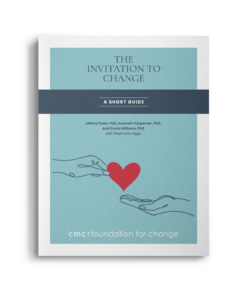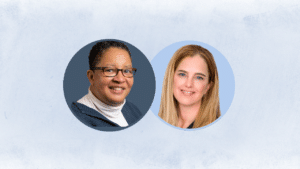Heather Ross, host of the Living with Addiction podcast, recently shared her thoughts about our new video: One Size Does Not Fit All.
The video aims to demonstrate the harms—and even the absurdity—of forcing every person who struggles with substances to seek help in the exact same way.
Comparing a concerned parent’s conversation with a treatment center to another parent’s (much lower-stakes) conversation with a customer service rep, we hoped to demonstrate first through humor, and then through grounded emotion, how vital it is to listen to the unique feelings, struggles, and needs of every person who is considering seeking help for substance use.
Our small team worked hard to make the video reflect the reality that many people and their families face when they try to seek help that makes sense for them. Because unfortunately, people are frequently shamed for expressing their concerns, fears, or unique needs, told that they are “in denial” or making excuses just because they want treatment that makes them feel safe. We need to realize that it is possible to support different paths to recovery—as many ways out of substance use as there are ways in. Patience, compassion, and understanding can save lives.
There is nothing we can say about the impact of this video, and this idea, that will match the thoughtful and touching remarks that Heather made about her own experience with her daughter, using the One Size Does Not Fit All video as a jumping-off point.
Heather, thank you for your analysis of our video, and for sharing your experience.
Readers, we strongly encourage you to watch Heather’s video and hear her thoughts, or to read the transcript below.
+++
Heather: That video just sits so heavy with me. It’s almost hard for me to watch. The first time I watched it, I was really brokenhearted—because I could see so much of my experience in it. And my experience of how I felt as a parent, versus—I can’t even imagine what that experience was like for my daughter…during the time when I couldn’t hear her, I wasn’t able to validate her experience, and a lot of the people that we worked with were not’ able to validate her experience either. And a lot of the people we worked with who I was looking at as the experts to help us, they just didn’t help us.
I found this excel spread I made the other day…and it was just a really high level list of all the people we went to, to look for help. And there was doctors and counselors and psychiatrists and psychologists on that list, and I couldn’t believe how many of them, after just a couple of visits, said that they just wouldn’t help us anymore, that we weren’t making progress fast enough. “We” meaning “she”—I felt like I was really in it with her at that point.
She wasn’t making progress fast enough, or she wasn’t fully sober. Or I remember one psychologist that she went to for quite awhile, twice a week, she just turned on a dime one day and said, “I’m not gonna see you guys anymore, and I don’t think I can help you.” And I just remember how overwhelmed I felt in that moment. But I can’t even imagine how overwhelmed my daughter felt, or how she felt like the one person that was helping her and had really seemed like she was on her side—Helanna was able to make some progress with her, she just wasn’t making the progress that was needed.
And at the time, I really wasn’t working on myself yet, to the degree that I would end up working on myself later. And so we just didn’t have the whole family dynamic that we needed for healing. And when I think back about that experience, all of those experiences where all of these people that we went to for help basically turned us away because we couldn’t do things exactly the way that they wanted us to, or their one size fits all approach, it’s really hard for me not to think about what things would be like today. Or how they would have been different—all of those years of pain, just how things would have been different if I had found one person who had recommended something like CRAFT. Or one place. If I had found a way to understand addiction sooner.
I mean there’s just so much—I’m sure if you’ve Googled it, and spent as much time as I did on the Internet, that you’d find as much stuff that really isn’t science-based, that’s a lot of opinion-based, damaging, old school—that, “if they really want it, they’ll do it” approach.
I wrote a couple of things down from the shoe example, and I love the way they made this video, and made the comparison of shoe sales. I mean it’s shoes, and we would not put up with that crap if it was shoes, and someone was treating us that way. But every day, we put up with that when it comes to our kids. And I don’t say that to be mean, or blame, because I did it, too. But I think that we have to keep having this conversation. We have to talk about this, we have to see how wrong it is, and that just because we’ve been doing it for a long time doesn’t mean that it’s acceptable.
So one of the things that they said in the video when it came to the shoes not fitting was, “If he wanted it, he’d make it work.” “He’s unable to commit to making it work, I can’t help that.” He has to accept help “their way,” and the Mom needs to stop “cutting him some slack.” I mean, I just can’t even imagine. And in the second part of the video, where it was the scared parent talking to a treatment center—the “addicts come up with excuses” because they want treatment for PTSD. And that’s being called a case of “terminal uniqueness.” And I heard that term a lot in AA meetings. The treatment center calling themselves, “we’re the experts,” calling the parents “over-involved and codependent” as if parents don’t want to help their kids, and as if parents wouldn’t be desperate if it was their kids.
I’m sick of parents being shamed for wanting to help their kids, and being called codependent and enablers. Both of those words are so shaming and condemning, and they make people feel like they can’t even love their kids, like nothing that they do is okay, and it just compounds the fear so much—that they’re just paralyzed with fear. And I’ve been there myself. And I think it’s time that we stop using those words and we stop condemning ourselves on top of it, and give ourselves some grace for how hard the situation is.
Of course, there is always, you know, the “your child could die.” As if we didn’t know that already, right? As if we didn’t think about it all the time, as if we hadn’t even thought about that. I just remember all the times one of the rehabs Helanna was in, when she would be trying to leave and they would be trying to talk her into staying, and that would be the whole thing—“you’re gonna die, you’re gonna die, you’re gonna die.”
And those phone calls where they’re calling me or FaceTiming me and wanting me to talk her into staying—which of course I was totally onboard with doing whatever I could to get her to stay—but it was just so traumatic to hear that over and over again, like, those things play over in my mind.
And then saying, you know, that “you should just kick him out.” We wouldn’t say these things about any other struggle that somebody was going through in life, and I keep making these comparisons lately, because I think it’s really important to help change the conversation, to help change the stigma, to help you see, to set you free from these painful beliefs, and these painful stigmas that we face as a family as well—that if somebody had a heart condition, and they were still eating poorly, we wouldn’t be called an enabler or shamed or called over involved, if we were helping them get medical services that they needed.
If it was a diabetic eating sugar, if it was somebody who had cancer and was given specific things to avoid like—for me, I’m not supposed to drink alcohol, there’s other things I’m supposed to avoid—imagine my family telling me they’re not gonna talk to me anymore and they’re gonna kick me out because I had a drink at Christmas and might get cancer again. I just can’t imagine that.
Or even when I first got breast cancer, my family telling me, “You did it to yourself, Heather. We’re not sure how or why, it’s probably a combination of your genetics, your lifestyle, and your environment, but we’re blaming you for your breast cancer, and we can’t enable you or be overly involved. So you need to figure this out on your own, because you caused this.” I can’t even imagine. But yet, that is what we are advised to do with our kids, all the time.
And it’s unfair that we’re even put in that position, and that’s why I loved this video so much and why I wanted to share it with you. Because Since Helanna died, I’ve been really just still changing a lot of my beliefs, still seeing a lot of ways that I even struggled with worrying about enabling, a lot of ways that I worried about being over-involved—and not once since she died have I ever wished I was less involved.
There is nothing, no scenario I’ve gone through, there’s nothing where I’ve thought, I wish I had helped her less. So I can’t even imagine any other case in our lives where this would be acceptable, but for some reason, because of the stigma with mental health and everything else, we’ve accepted this with addiction, and that is where the experts got me and my family for the first at least 6 years of Helanna’s addiction.
Now, I’m not putting down all experts, and I’m not blaming those people. because they were taught that as well. And a lot of those people really want to help, they believe in what they’re doing, they believe that what they’re telling us is helpful to us. And they have the best intentions. And there are many experts and many places out there that I’ve heard of that I wish I’d known about when Helanna was younger, that do help kids, and do help families, and do give good advice, good steps to take.
But that was not my experience. And that, I know, is not everybody’s experience. A lot of people go through what I went through, and it’s really a disservice to us and to our kids. And so I just want you to know that when something doesn’t feel right, maybe you should step back and listen to your instincts—because I believe wholeheartedly that nobody knows your child better than you, and that you are best suited to help your child and support them and stay in it for the long run. So it is so important to educate yourself about addiction, the scientific facts about it, to research it, to listen to people that make sense, and then sometimes even maybe listen to people who don’t make sense at first.
Right? Like, I was listening to this podcast the other day, it had ideas about addiction that I’d never even heard before, and some of it I completely disagreed with, and some of it did make sense to me, and some of it was a little bit freeing. So I’m gonna keep listening to it, I’m gonna take what I like and leave the rest—and that’s what we need to be in the place to do. We need to be the person we’ve been looking for to help us, and the person that we’ve been looking for to help our child.
I just want to remind you that you are the perfect parent for your child, and you have what it takes to learn everything you need to learn to get through this, and to support yourself and to support your child. And I will just be here believing in you until you’re ready to believe in yourself.




